Do you want to reset your WordPress password using phpMyAdmin?
If you are unable to reset your WordPress password, then there is a way to reset it directly in your WordPress database using phpMyAdmin.
In this article, we will show you how to easily reset a WordPress password from phpMyAdmin.
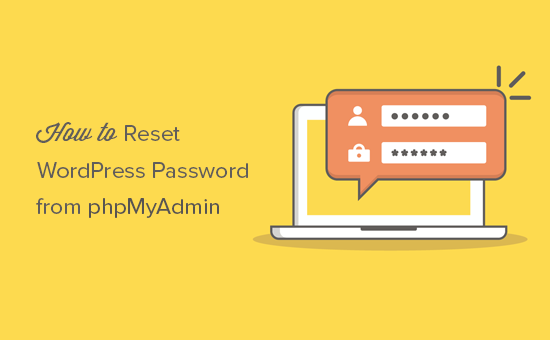
Why Reset a WordPress Password From phpMyAdmin?
WordPress makes it super easy to recover a lost password.
You can simply go to the login screen of your WordPress website and click on the ‘Lost your password?’ link.
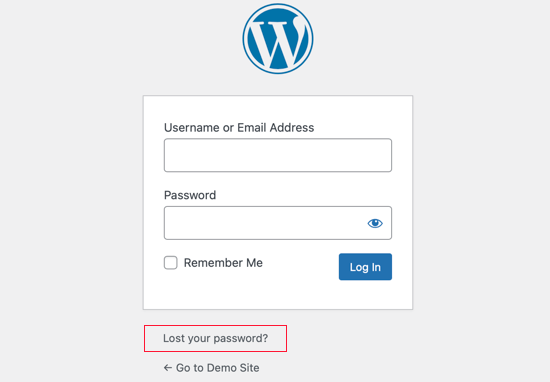
When you click on the link you are taken to the password reset page. Once you enter your username or email address, WordPress will send a password reset link to the associated email address.
However, if you don’t have access to that email address, or your WordPress site fails to send an email, then you will not be able to reset your password.
In such a situation, you will need to reset your WordPress password directly in the database. The easiest way to do that is by using phpMyAdmin.
Having said that, let’s see how you can easily reset a WordPress password from phpMyAdmin.
How to Reset a WordPress Password From phpMyAdmin
If you don’t want to watch the video tutorial, then you can continue reading the text version below.
First, you need to log in to the cPanel dashboard of your WordPress hosting account. Next, you need to navigate to the Databases section where you can click on the phpMyAdmin icon.
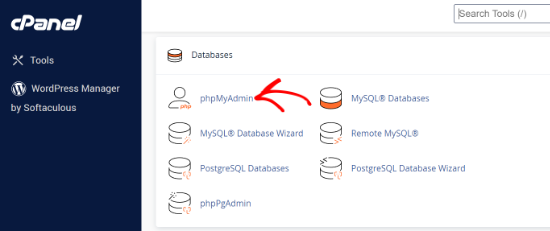
This will launch the phpMyAdmin app.
Here you need to select your WordPress database from the left pane.
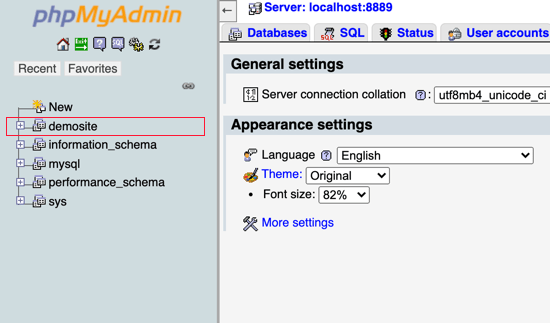
You will now see the list of tables in your WordPress database.
You need to look for the wp_users table in this list and click on the ‘Browse’ link next to it.
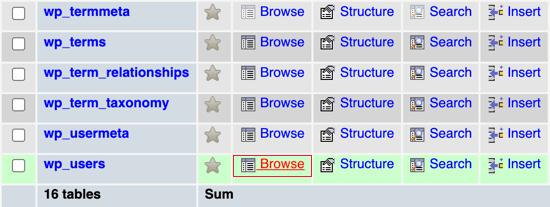
Note: Table names in your WordPress database may have a different prefix than the one we are showing in our screenshot. Changing table prefixes can improve the security of your WordPress site.
You will now see the rows in your WordPress users table. Go ahead and click on the edit button next to the username whose password you wish to change.
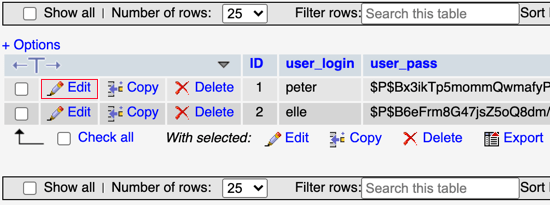
PhpMyAdmin will show you a form with all the user information fields.
You will need to delete the value in the user_pass field and replace it with your new password. Under the function column, select MD5 from the drop-down menu and then click on the Go button at the bottom of the form.
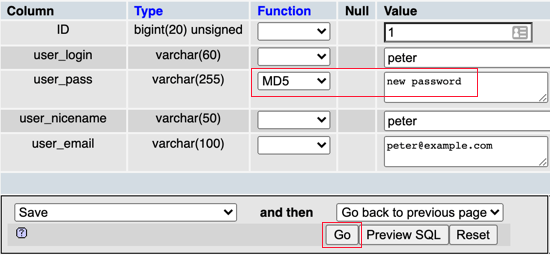
Your password will be encrypted using the MD5 hash and then it will be stored in the database.
Congratulations! You have successfully changed your WordPress password using phpMyAdmin.
Some of you may be wondering why we selected the MD5 hash to encrypt the password. WordPress previously used MD5 hash to encrypt passwords, but since WordPress 2.5 it has been using stronger encryption technologies.
However, WordPress still recognizes MD5 to provide backward compatibility. As soon as you log in using a password string stored as an MD5 hash, WordPress will automatically change it to use the newer encryption algorithms.
Expert Guides on Passwords in WordPress
Now that you know how to reset a WordPress password from phpMyAdmin, you may wish to see some other articles related to passwords in WordPress.
- How to Change Your Password in WordPress (Beginner’s Guide)
- How to Reset Passwords for All Users in WordPress
- How to Customize the WordPress Reset Password Page
- How to Force Users to Change Passwords in WordPress – Expire Password
- Forgot Password? How to Recover a Lost Password in WordPress
- How to Force Strong Passwords on Users in WordPress
- How to Add Two-Factor Authentication in WordPress (Free Method)
- How to Allow Users to Hide/Show Passwords on WordPress Login Screen
- How to Easily and Securely Manage Passwords (Beginner’s Guide)
We hope this tutorial helped you learn how to reset a WordPress password from phpMyAdmin. You may also want to see our ultimate step-by-step WordPress security guide to keep your WordPress site safe or our expert pick of must-have plugins.
If you liked this article, then please subscribe to our YouTube Channel for WordPress video tutorials. You can also find us on Twitter and Facebook.





Syed Balkhi says
Hey WPBeginner readers,
Did you know you can win exciting prizes by commenting on WPBeginner?
Every month, our top blog commenters will win HUGE rewards, including premium WordPress plugin licenses and cash prizes.
You can get more details about the contest from here.
Start sharing your thoughts below to stand a chance to win!
Liang Huang says
Thank you so much. The instructions were easy enough to follow. God bless you
Sonu says
Really Helpfull
Luke says
I have no WP_users at all. What do I do?
Abhishek Rawal says
Thank You so much!
Worked like a charm
Stegemüller says
I have fighting with passwords for hours. Then I found this guide and I was home free. Thank you very much.
Birgit says
Super! Helped me a lot.
Harsha says
Thank you!
Aarthi Rengaraj says
Perfect tips and was very helpful in getting my client’s domains password changed. I was struggling and that “MD5” tag thing was actually missing. Thanks so much. This is the best place for any WordPress queries.
Susan says
I am locked out of WordPress, my site is down. I can go into my c-panel. If I change the password to an encrypted password, do I now copy that and use it to log in? I really don’t get it? It is encrypted isn’t it? What do I now use to log into my WordPress? Do I use the log in name and email that is there in the c-panel?
Thanks
Charles Allen says
Susan, the MD5 is like a secret recipe where one ingredient is missing. Let’s say we are pen pals and we are going to meet for the very first time. Since I have never seen you, I need a way to know that it is really you. One way to do this if you can send me a piece of homemade cake and a list of all but one secret ingredient. When we first meet, you will finally tell me what the secret ingredient is, and then I will bake my own cake with the exact recipe. If the cake I makes is exactly same as the cake you sent me, then I know you are really my pen pal. The MD5 is the completed cake, and the plain password you came up with is the secret ingredient. When you send the password to WordPress, it will use your secrete password ingredient to see if it can bake its own MD5 cake. When you log into WP, use the plain text password. Your WP user name is usually different from your cPanel name. If you forgot your user name, it will be listed as “user_login” in the database.
Jivanti says
Hello there,
I seem to be getting the username is invalid commad everytime I try to login.
But the username and password is correct. It seemed like I might have created a different user name the first time I got locked out of my account. Or I forgot to renew my domain. I really can’t remember.
When I use a different username, I’m able to log in into WP dashboard and do theme changes but it is not reflecting in my current website.
The current dashboard does not have any of my old post or images.
I logged into to my cpanel and checked under the myphpadmin, there is 2 database. One of it contain the old posts and images. I tried the above method using the MD5, I’m still unable to acess the old user id and my old post.
I suspect the current active site is configured at the old database.
Another question, when I reset the password through MD5, do I copy this same new rest password that was generated in the phpadmin screen ( the long one) and paste it in the wp login screen. I tried it. It didn’t work.
Please help.
Randy says
Works well.. Thank you!
slim says
i just followed the process but it did not work out
hendryhowser says
make sure your user_login is the same as user_nicename.
david h says
Great help – thanks!
Eduardo Alfaro says
Thank you very much guys! this was great
Harry says
Sir I was changed my wordpress admin password in the same way but now it my dashboard is not opening it is showing a wrong password but I have changed it. Sir please help me………
yuseph says
I tried to do it without choosing md5 and it won’t do it. Thanks much appreciated
Spock says
Good advice, but spoken too rapidly. Slow down the delivery.
Charlie Sasser says
An easier way is to use phpadmin and just change the email address to your current email and then go to regular login and click on “Forgot Password” and reset from email link. No need to worry about MP5 and all that stuff.
WPBeginner Support says
This wouldn’t work if WordPress is unable to send password reset emails.
Admin
Greg says
Thank you for the MD5 function in phpmyadmin.
Very helpful to me.
Akash says
but im using defult url is it safe or not for my site
John says
I wish people who make training videos would slow down they are always rushing through it as if they have a train to catch, So slow down and you will have great training videos…
Dee says
Just wanted to say tell you how great your daily email is! Thanks
Editorial Staff says
Thanks Dee
Admin
Peter says
I don´t know what kind of hash it is, but it´s not default form of MD5. WordPress password hasher does the job fine.
Darshan Krishnan says
Thank you very much, Syed and team WPBeginner.
My site was put in maintenance mode and hence password reset option did not work.
I changed the password as you suggested and everything is back to normal.
Much thanks for the awesome content.
Manoj says
Really would like to say thank you as I find it really hard to change the password of my site
John says
Awesome, thank you very much this has been a massive help
Ssk says
Awesome! Helped me reset my password when I kept getting the “Host disabled the mail () function” error.
Luis says
Hi! I’m s using mamp as local host, and i’m having some troubles with it: I can’t recover my wordpress password by setting a new one on phpMyadmin. It shows that the password row has been updated to the new one I chose, but it is not recognized by wordpress.org when i try to log in. Can’t figure out what may be the problem. I’m giving up on hosting my site on MAMP. I’ve seen that I can create a new database with cPanel, since I’m paying for hosting service from namecheap. What do you suggest for starting a new project from zero? Thanks a lot!
Sieu Nguyen says
Thanks you. I lost my password and I used this way to create a new password.
Benji says
Unfortunately this isn’t working for me. I’m doing exactly what your asking, but when I made a new password using the MD5 Hash and copy and paste that new password in the field > save by hitting Go > then go to refresh my Website admin log in page, I enter the new password and still tells me I’ve entered the wrong password??? I’ve tried email recovery but never get sent an email… So painful!
Any idea’s?
Joe says
I’m getting this too, it is driving me mad! Would really appreciate some help on this
Dave says
You don’t use the hashed password. Let’s say you set your new password to “letmeinalready,” choose MD5, and save it. You wouldn’t use that hashed password to get in – you’d use “letmeinalready”
Linda says
Same problem here. I have followed all instructions to a T and it’s just not working. Can my web host chat help me? Me web developer has disappeared with this information.
WPBeginner Support says
Yes, if you reach out to your hosting provider they should have access to update your password for you
Erik Chhuo says
wow, this is way too fast a video clip for me. Just can’t follow any. Didn’t even where to start.
Karen says
Do you have to be logged into your admin to start with? I can’t even log in to do any of the above!!!
Heather says
This is not working for me…still cannot login
jan says
awesome, very old post, but still being read and replied to!
I used Duplicator to copy a one-page WP-site to localhost (XAMPP). Made a new database as instructed, password and everything.
When I try to enter local password (or is it the database password?), screen reverts to site published on cloud host.
Localhost DB has two entries: for Duplicator (prefix 2ecxx_) and what I thought was local copy (prefix wp_). But the ‘local’ DB _wp entries are actually referring to the cloud hosting environment.
Tried to change wp_user username en PW (MD5), but does not work
Changed siteurl in _wp_options to localhost, does not help
When I use 2eczz_users username and PW, page also moves back to site published in the cloud
stalony says
Does this tutorial still relevant in 2017 ????
WPBeginner Support says
Yes, it is.
Admin
Mohamed Gees says
Thanks A lot, VERY INFORMATIVE ARTICLE, i was up and down last two days. . you saved me. Thanks again
Ringo says
Really would like to say thank you as I find it really hard to change the password of my site
Qamar Naveed says
Very informative article, i was stuck at database name, finally found with the help of this article.
Rachel Ortiz says
Thanks so much. I am NOT a programmer whatsoever and these instructions were easy enough for me to get. This was a lifesaver.
Kareem Said says
Thanks for the MD5 tip
Denis says
This was very good. thanks !
Esteban Zerega says
great contribution master! thank you so much!
Venkat says
It’s Awesome bro..you saved my time. Its working fine for me
Tamara says
I have followed the steps exactly and still can’t log in. Is there anything else I can do?
Csbr says
The layout has changed a lot since this was posted- the admin tab or the browse tabs are nowhere to be seen..
Charles Kinga says
Lot of thanx guys. It has worked for me and was stranded on my website security but now am fine.
The procedures are very user friendly hence easy to understand.
God bless
Camille says
I did all those steps but I still cannot login into my wordpress wp-admin. Can you help me? Thanks.
John Osmond says
Why not use the md5 hash that is already there in phpMyAdmin? Just open the drop-down in the functions column. I will md5 hash your plain text password for you.
Sara Moreira says
genuine <3
thank you for all the know-how and tricks you share!
WPBeginner Support says
Thanks Sara we are glad you find them useful. Don’t forget to follow us on Facebook for more WordPress tips and tutorials.
we are glad you find them useful. Don’t forget to follow us on Facebook for more WordPress tips and tutorials.
Admin
Elgin Martinez says
Sir/Madam
I am interested in becoming a professional web designer using the WordPress platform but don’t know where to start. Any advise thanks.
Frank Nsia says
Thank you so much. The instructions were easy enough for even me to follow. God bless you